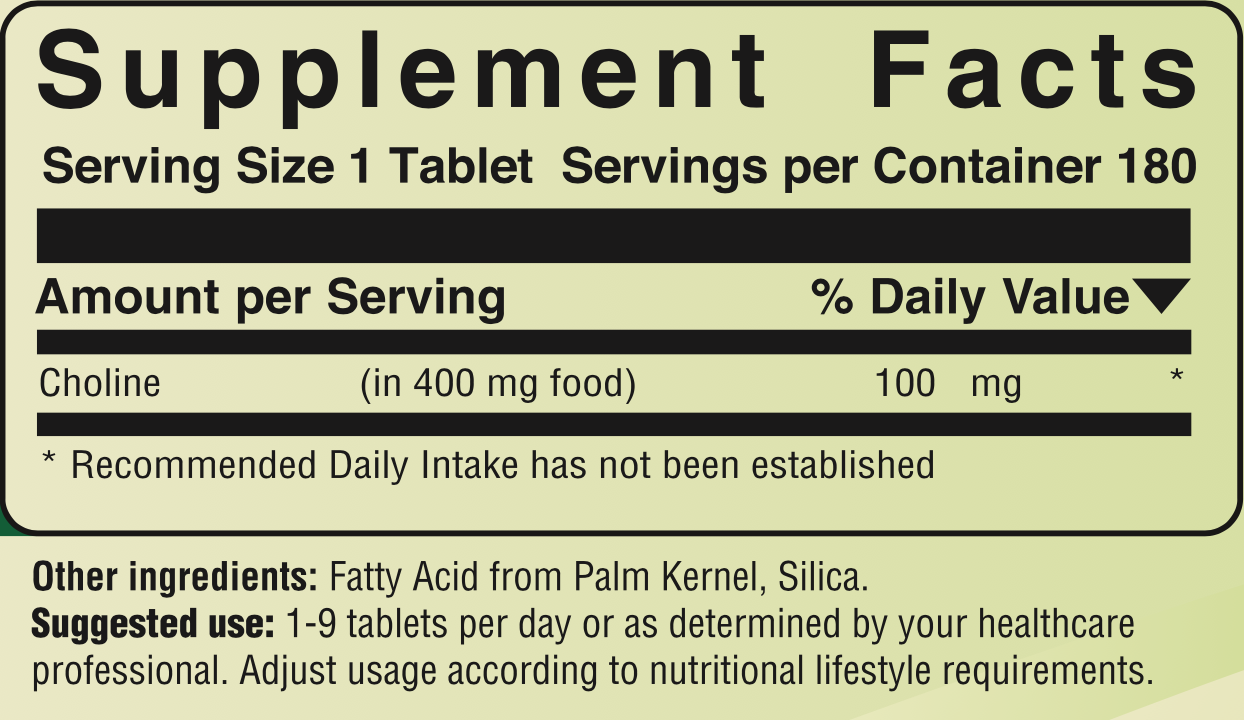
180 Tablets $33.98
“Choline is crucial for sustaining life. It modulates the basic signaling processes within cells, is a structured element in membranes, and is vital during critical periods in brain development” [1]. It was discovered in 1862, yet it was not recognized as a required nutrient for humans until 1998 [1].

“Choline
has several important functions: it is a source of methyl groups
needed to make S-adenosylmethionine, it is a part of the
neurotransmitter acetylcholine, and it is a part of the predominant
phospholipids in membranes (phosphatidylcholine and
sphingomeyelin). Betaine, formed from choline, is an important
osmolyte in the kidney glomerulus and helps with the reabsorption of
water from the kidney tubule. Although they represent a smaller
proportion of the total choline pool, important metabolites of choline
include platelet-activating factor, choline plasmalogens,
lysophosphatidylcholine, phosphocholine, and glycerophosphocholine” [1].
Choline is a quaternary amine which is required to make phospholipids
and other substances necessary for all cell membranes, including myelin
sheath which covers nerve cells. It is necessary for gall bladder
regulation, liver detoxification, carnitine metabolism, and nerve
support. Choline is needed to form the neurotransmitter
acetylcholine. Fatty deposits in the liver are associated with a
choline deficiency. Choline helps prevent the formation of fatty
liver by promoting the production of lecithin. Choline helps in
the strengthening of weak capillaries, thereby helping in the reduction
of hypertension. Since choline deficiencies have been shown to
raise cholesterol, it can be helpful for people with cholesterol
concerns. Choline is believed to help insure effective DNA
repair. Choline appears to be needed in serum plasma and various
metabolic functions. It may have beneficial effect for
cholesterol as well as for people with Alzheimer's. High amounts of
oral choline can result in dizziness, nausea, diarrhea, depression, and
a fishy odor [2]. Postmenopausal women seem to need more choline
than other women [1].
“Phosphatidylcholine may be indicated to help restore liver
function in a number of disorders, including alcoholic fibrosis, and
possibly viral hepatitas. It may also be indicated for the
treatment of some manic conditions. There is some evidence that
Phosphatidylcholine may be useful in the management of Alzheimer’s
disease and some other cognitive disorders. A possible future
role in cancer therapy is also suggested by recent research. It
may also be indicated in some with tardive dyskinesia.
Phosphatidiylcholine has been used to lower serum cholesterol levels,
based on the premise that lecithin cholesterol acyltransferase (LCAT)
activity has an important role in the removal of cholesterol from
tissues” [3].
“Increased choline intake has recently been recommended by the Food and
Nutrition Board of the National Academy of Sciences for pregnant and
nursing women to help ensure normal fetal brain development. And,
like phosphatidylcholine …, choline may be helpful in some liver
diseases, manic conditions, cognitive disorders, tardive dyskinesea
and, possibly, some cancers.” [3]
“Healthy humans with normal folate and vitamin B12 status who were fed a choline-deficient diet developed liver damage…a diet deficient in choline has major consequences including hepatic, renal, pancreatic, memory, and growth disorders…Large amounts of lipids (mainly triglycerides) can accumulate in the liver…Choline deficiency causes cancer in rodent models” [1].
Some
have claimed that choline is vitamin B-4 and is helpful for
cardiovascular health [4]. Yet while there are cardiovascular
benefits associated with food choline, it appears that what was once
called vitamin B-4 was probably more accurately a substance known as
adenine [5], which is not choline. Both adenine and choline play
a role in ATP metabolism [1], and choline can have cardiovascular
benefits, but calling it vitamin B-4 seems inaccurate.
Regarding
choline, WebMD reports, “Athletes use it for bodybuilding and delaying
fatigue in endurance sports” [6]. Low levels of choline have been
found in endurance athletes and supplementation may decrease fatigue
during exercise [7].
While probably the best food form in supplements is from specially-grown Saccharomyces cerevisiae, choline is also found in eggs (yolks) and liver [1,11].
The official Recommended Daily Intake of choline is as low as 125 mg
per day for infants up to 6 months of age to as high as 550 mg per day
for lactating women (the RDI for non-lactating women is 450 mg per day)
[1]. The RDI for adult males is 550 mg per day
[1].
Many people simply take choline to feel better.
Choline Complex Video
Nutrition from food, what a concept!
References
[1] Zeisel S. Choline. In: Modern Nutrition in Health and Disease, 11th ed. Wolters Kluwer| Lippincott Williams & Wilkins, 2012: 416-426[2] Neumann C, ed. Serious Nutrition. FR International, Canada, 2005
[3] Hendler SS, Rorvik DM. PDR for Nutritional Supplements, 2nd edition. Thomson Reuters, 2008, Montvale (NJ)
[4] Whelan WJ. What’s in a Name? Vitamin B4. IUBMB Life, 57(2): 125, February 2005
[5] Vera Reader. The assay of vitamin B4. Biochem J. 1930; 24 (6): 1827–31
Choline.
[6] WebMD. http://www.webmd.com/vitamins-supplements/ingredientmono-436-CHOLINE.aspx?activeIngredientId=436&activeIngredientName=CHOLINE viewed 07/02/13
[7] Castell LM, Burke LM, Stears SJ, et al. A-Z of nutritional supplements: dietary supplements, sports nutrition foods and ergogenic aids for health and performance. Part 9. Br J Sports Med. 2010;44(8):609-611
[8] Inositol. Web MD. http://www.webmd.com/vitamins-supplements/ingredientmono-299-INOSITOL.aspx?activeIngredientId=299&activeIngredientName=INOSITOL viewed 05/14/13
[9] Andlid TA, Veide J, Sandberg AS. Metabolism of extracellular inositol hexaphosphate (phytate) by Saccharomyces cerevisiae. Int J. Food Microbiology. 2004;97(2):157-169
[10] Vitamin-Mineral Manufacturing Guide: Nutrient Empowerment, volume 1. Nutrition Resource, Lakeport (CA), 1986
[11] Balch JF, Balch PA. Prescription for a Nutritional Healing, 2nd ed. Avery Publishing, Garden City Park (NY), 1997
Some of these studies (or citations) may not conform to peer review standards, therefore, the results are not conclusive. Professionals can, and often do, come to different conclusions when reviewing scientific data. None of these statements have been reviewed by the FDA. All products distributed by Doctors’ Research, Inc. are nutritional and are not intended for the treatment or prevention of any medical condition.
 |
||
|
||